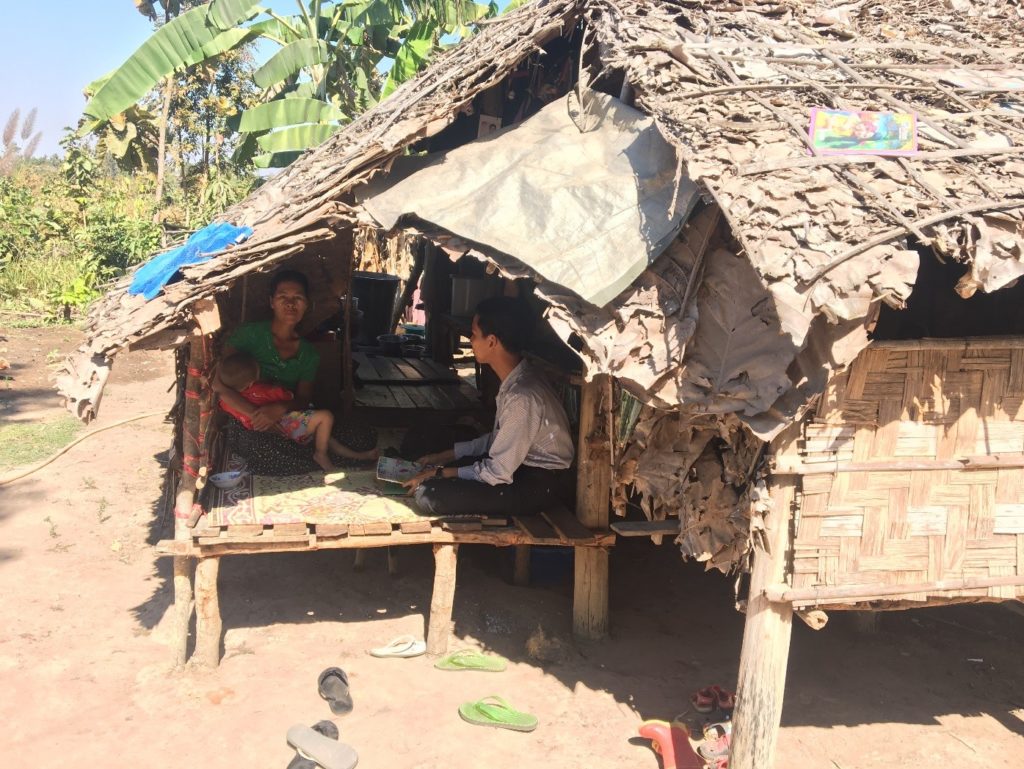Newly Trained Volunteer Saves Burmese Child’s Life with Speedy Diagnosis & Referral
September 13th, 2018 | viewpoint
Kayin State, Burma – Sometimes it doesn’t take years of experience to make an impact—it can happen almost immediately.
Ma Linn Lat Htun, an integrated community malaria volunteer (ICMV) in Pwint Lin Aye, a small village near the Burmese-Thailand border, had only recently completed her training on infectious diseases when Daw Yin Yin Myo approached her for help. The 42-year-old mother said her one-year-old boy, Mg Min Khant, was suffering from a high fever and vomiting.
Fortunately, Ma Linn Lat Htun had been trained by the Ministry of Health and Sports (MOHS) with MCSP support on a package of infectious diseases. After learning the family’s medical history and examining the child, she suspected Mg Min Khant had dengue hemorrhagic fever (DHF). The ICMV explained the signs and symptoms of the disease to the boy’s mother, instructing her to take her son to the nearest health center immediately.
Daw Yin Yin Myo complied with his advice, and the basic health staff (BHS)—who are also trained by the MOHS and MCSP—examined her son according to the Integrated Management of Newborn and Child Illnesses guidelines. They concurred with Ma Linn Lat Htun’s assessment and strongly encouraged Daw Yin Yin Myo to take her child to the nearest health facility for lifesaving treatment.
Fortunately, Mg Min Khant’s family accepted the diagnosis, and he was taken to the nearby Township Hospital in Myawaddy. The BHS visited the child at the hospital, offering support and guidance to his family, such as clarification on treatments. After two days of in-patient treatment, Mg Min Khant was discharged from the hospital and returned home.
But Ma Linn Lat Htun’s involvement didn’t end there. She visited the patient’s home for a follow-up visit with MCSP Program Officer Dr. Thu Naing, who conducts supportive supervision visits to all ICMVs to assess their skills retention. Together, they explained the methods of DHF transmission to Daw Yin Yin Myo, suggesting that her family sleep under insecticide-treated bed nets and keep Mg Min Khant away from mosquitoes during the day to prevent spread of the illness.

“The ICMV plays a significant role in my community,” Daw Yin Yin Myo told Dr. Naing during his visit, “because the ICMV often explains complications of diseases and their diagnosis.”
Dr. Thu Naing agrees, noting that ICMV programs have improved linkages between health facilities and the community, ensuring the presence of trained ICMVs in critical lifesaving moments. With proper training and support, healthcare personnel—including community volunteers like Ma Linn Lat Htun—are playing a critical role in disease control and prevention in Burma.
Training of ICMVs is an innovative outgrowth of the country’s success against malaria. Cases of the disease have significantly declined since 2010, when the National Malaria Control Program began training and deploying more than 40,000 volunteers to conduct community-based malaria case detection, and treat and refer severe cases of the disease.
In 2017, recognizing this well-trained and highly effective cadre of frontline health workers as a valuable national resource, the MOHS developed a new strategy to expand the role of malaria volunteers to address five additional communicable diseases: TB, HIV, DHF, filariasis, and leprosy. As a result, the title of “malaria volunteer” was changed to “integrated community malaria volunteer.”
Prior to her six-day ICMV training—which included robust discussions, case studies, demonstrations, and practical exercises—Ma Linn Lat Htun only had knowledge to diagnose and treat malaria. Her newly acquired skills allowed for a quick and accurate diagnosis of DHF. These expanded skills, and close collaboration with the township level health staff, led to a lifesaving referral for Mg Min Khant to the nearby hospital, ensuring his survival.
Written by Thu Naing and Ashley Schmidt
In two diverse regions of Burma—border town Myawaddy and remote, mountainous Mindat—MCSP and Burma’s MOHS have updated the skills of 74 ICMVs and developed 60 master trainers. The latter, in turn, are increasing the pool of health care professionals knowledgeable of the new guidance.
Together, they are making lifesaving diagnoses of additional diseases, reaching the most vulnerable in their communities and saving children’s lives.
This blog is cross-posted with permission from USAID’s Flagship Maternal and Child Survival Project.
We strive to build lasting relationships to produce better health outcomes for all.